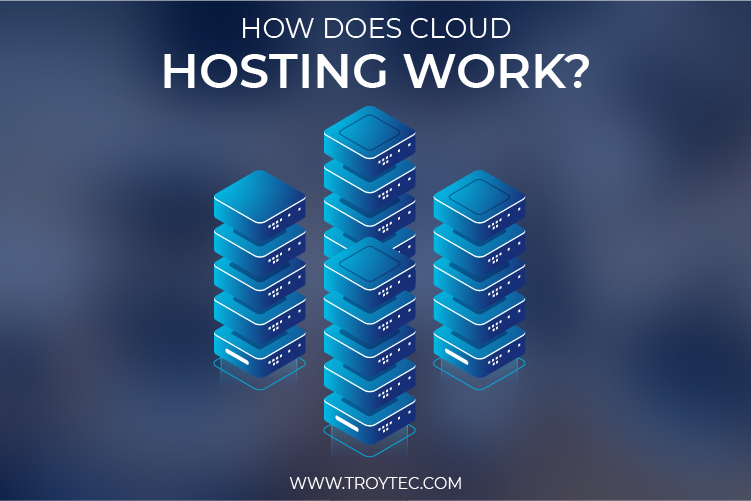Table of Contents
What Is Cloud Hosting and The Way It Works: The Ultimate Guide You Are Looking For
Most people and businesses are still unaware of cloud hosting and why it is vital for their websites in this new era of technologies. It is one of the best cloud management services available globally. With many hosting tools, you can save your organization’s site data on the cloud platform and get access to the data no matter where you are.
Now, everybody is moving towards the cloud. In this new era of the business environment, every owner or leader is looking to minimize costs and maximize efficiencies. As technologies endure to evolve, institutions and organizations are looking for innovative and new methods and techniques to manage their website hosting requirements. Due to its performance, reliability, security, pricing, and flexibility, every business is moving towards cloud hosting. One of the primary reasons businesses or website owners move towards the cloud is its “Reliability.”
As a substitute for hosting the web or application on a single machine, it empowers you to feast your organization’s data across various interrelated servers located in a broad geographical area. These kinds of servers only exist in a virtually created environment.
We will discuss the ultimate guide to cloud hosting and how it works. Keep reading the article to get a more profound knowledge of about it.
What Is Cloud Hosting?
It is the kind of web hosting that empowers a web to utilize multiple server resources, which results in faster performance. In simple words, it involves storing and keeping your data across multiple servers. Cloud hosting provides web hosting on virtual servers. The traditional hosting plan is only on a single server. It means its resources and data are put away or stored and delivered from one detailed computer.
Cloud hosting is one of the leading hosting services because it allows you to share the server with other people. It does not hinge on a single server. The significant advantage of using cloud hosting is its scalability. Cloud hosting is a new sort of facilitating which has become uncommonly worthwhile in a couple of years. The fundamental thought of cloud facilitating is “Separation and Rule”: the assets required for dealing with the site are partitioned across a few servers and are used in an on-request premise. It limits the probabilities of any vacations if there should be an occurrence of a server glitch.
Cloud hosting essentially rotates around the virtual storage, hardware, complex, and network solutions from any cloud hosting provider. Cloud hosting enables the websites and apps available to utilize the various cloud resources. Picking cloud facilitating relies upon your site’s necessities and prerequisites. If your web page is quickly developing and you need a server that changes with your site’s traffic and development, then cloud facilitating is the ideal decision. You will get your own space for your site on a server. Organizations with the most extreme assets broadly utilize this streamlining. It can accelerate the development of your site at a higher speed.
How Does It Work?
Cloud hosting mainly works through the means of virtualization. Cloud hosting is the best technology that breaches a physical server into various virtual cloud servers. Then these cloud servers interconnect to develop a single network for website hosting. These are isolated conditions on which your site will sit. If one place encounters a spike in guests or a strain on assets, it can plunge into different actual servers to help execution.
Contrasting cloud hosting with a solitary server is the simplest method for separating it. In customary facilitating, all your site information is put away in a solitary organization. So when a client visits your site, your documents are served up from your allocated single server. Cloud Hosting produces plenty of advantages for clients and is even viewed as a strong choice relying on your business. One of the advantages is that assuming any of your servers drop your information, it will save in another server.
The assets expected for your site to work are numerous servers spread across the web. Since every one of the servers is virtual, obliging information in various servers is simple. Being perhaps the most financially savvy and adaptable kind of facilitating, you just compensation for what you use. The additional assets accessible for site development won’t cost additional or extra cash.
Major Types of Cloud Hosting
Many cloud hosting plans work differently. Here are the types of cloud hosting:

Private Cloud Hosting
Private cloud hosting is a hosting environment devoted to a single business or individuals. You cannot share your hosting with other tenants. A private cloud is customarily set up behind a client’s firewall, guaranteeing sole admittance to the whole cloud foundation. While the first conveyed secret mists on-premise, they can now send them through outsider private cloud specialist co-ops. Associations commonly utilize private sprinkles that require upgraded command over their current circumstance – like government offices and monetary establishments.
Private cloud hosting comprises various dedicated servers that empower you to have complete control over cloud hardware. Moreover, you have the authority to amend it in any war, and anywhere you want. Private cloud hosting comes with a hefty price tag.
Public Cloud Hosting
The public cloud is the most generally taken-on model for cloud administrations. The cloud is fragmented to serve numerous inhabitants (clients) in this model. Be that as it may, the cloud assets, like the servers, registering power, stockpiling, and organizations, are claimed and overseen by an outsider – the cloud specialist co-op.
Public cloud-based administrations assist organizations with understanding every one of the advantages of the cloud. While fundamentally lessening forthright, functional, and upkeep costs. Famous public cloud specialist co-ops incorporate (Amazon Web Services AWS), (Google Cloud Platform), (IBM Cloud), (Alibaba Cloud), and Microsoft (Microsoft Azure).
Hybrid Cloud Hosting
Hybrid cloud hosting is a combination of public and private cloud hosting so that the user can benefit from both cloud hosting. It might utilize a hybrid cloud for adaptability in running various information and applications on multiple arrangements, for on-request scaling needs (when one climate runs out of limit because of spike popularity), or for reinforcement reasons (one climate is a reinforcement for another, essential climate). The other side of crossover mists is that they generally have a muddled framework, which requires significant ability to make due.
‘Cloud blasting’ is an application organization model inside which an application executes utilizing a private cloud or server farm and “explodes” to a public cloud once the necessity for figuring capacity boosts.
A critical benefit of cloud exploding and a mixed-race cloud model is that an organization spends on extra figure assets just when they are required. Cloud blasting permits server farms to help different highlights and capacities, in any event, during flighty varieties in handling necessities. This half-breed cloud based on heterogeneous equipment is named “Cross-stage Hybrid Cloud.”
Managed Cloud Hosting
As organizations compete to embrace the cloud, they’re starting to understand that overseeing it is an entirely separate ballgame. Cloud, the board, is a chaotic cycle, requiring a ton of skill, which can be extremely rare, relying upon the area of your business. Overseen specialist organizations (MSPs) remotely handle IT/cloud frameworks and sometimes end-client frameworks in the interest of their clients.
This model empowers clients to instead zero in on their everyday business activities without extending their finance to oblige costly experts who do barely anything to increase the value of their center contributions.
Advantages of Cloud Hosting
There are many benefits of adopting cloud hosting for your website. Here are the top advantages of using cloud hosting for your website:
Cost-Effective: One of the significant advantages of cloud hosting is it’s very cost-effective. You only have to pay for what you used. However, if you didn’t utilize any tools or services, you don’t have to pay for them. Isn’t it amazing? Instead of paying for the complete web hosting plan, your price will match the total cloud resources you’re utilizing. The evaluation of this server is entirely adaptable. You can scale your assets in this facilitating, which implies you need to pay for the waiter assets you use.
Increased Server Uptime: Your site enactment and performance are straightly related to the server uptime. The arrangement of the interrelated or interconnected servers guarantees no weak link among the network.
If any server goes down or can’t take your solicitation, one more server from the bunch takes over, keeping everything moving as expected. With conventional facilitating, in any case, any personal time or disappointment on your single server could bring about broadened vacation for your applications and site.
Security: Cloud hosting provides one of the best security services to its users. Everyone is aware of cyber-crime and hacking. Losing all website data can be the nastiest thing to your website. As cloud hosting provides data management services to multiple systems, there is less possibility of losing the data. In that way, your website data is secure if you choose cloud hosting as your hosting provider.
Automated Updates: One of the most significant advantages of cloud hosting is that you don’t have to update the tools manually, which everyone wants. Much time has been wasted on updating and maintaining your website system. Having a cloud hosting provider, you don’t need to do anything. The cloud server repeatedly updates and supports the software, giving you much time to focus on other essential things.
Flexibility: The flexibility that clouds are hosting provides is incredibly versatile. You don’t need to choose a standard plan offered by an average hosting provider other than cloud hosting. However, you can select a custom solution to meet your particular needs with your cloud setup.
Disadvantages of Cloud Hosting
Though there are numerous benefits of having a cloud hosting provider, some pitfalls cannot be neglected. Here are a few disadvantages of using cloud hosting:

Liability to Cyber-attacks: With cloud hosting, we can access almost all the data over the internet. One of the biggest pitfalls of having cloud hosting is its vulnerability. We all know that anything that can access the internet is not secure enough. Big organizations can also suffer undecorated or severe data breaches and attacks.
Speed: Cloud servers are generally gotten over the web, and the speed of your association with the web decides. The speed of your association with the server. The cloud facilitating specialist co-op constrains admittance to your servers.
It can’t be an issue if you have a dependable and quick web association. Notwithstanding, slow web associations typically lead to low speed, which can cause you to be exceptionally disappointed with the cloud-facilitated server.
Conceivable Downtime: This is one of the most terrible disservices of cloud facilitating. No cloud-enabling specialist co-op, even the notable, can keep away from this. Cloud-enabling depends on an organization of servers that rely entirely upon the web to work. Assuming there is any test with the web associations, clients will have issues getting to this help.
Conclusion
Undoubtedly, cloud hosting is one of the best hosting providers available now. But some vulnerabilities can affect your organization. If you want to move to the cloud, always remember that cloud hosting is a new and future technology. There are more benefits of using It than its pitfalls.
One of the essential benefits of cloud hosting is that you have to only pay for your services. Do you still have any doubts in your mind regarding cloud hosting? Comment below if you have some confusion or you want to ask a query about it. Troytec professional team is always there for your assistance.


Pingback:
Pingback:
Pingback: